L'Acadie Vineyards Blog
Welcome to the L'Acadie Vineyards blog and winery news
True Cost of Organic
True Cost of Organic
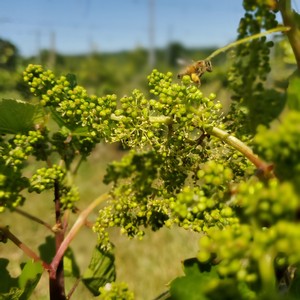
Beauty shot of L'Acadie Blanc in bloom photobombed by bee, 2024
Our Gaspereau vineyard has been organic from inception - 20 years next year since planting the first organic vineyard in Nova Scotia! Costs are substantial compared to conventional wineries but our drive comes from the heart and we wouldn't do it any other way. Here are some examples of the costs for organic wine,
Farming Practices
The organic approach is to manage a heathly living soil so that it provides for the vines. We brew plant-based grape pomace compost and horsetail teas, all from our property, to inoculate soil and protect leaves and clusters.
Pests are monitored and biodiversity is encouraged to attract natural predators with selected cover crops between rows, herbal plots of cilantro and dill, and natural forest.
Certification Costs
We have two levels of organic certifiication - producer (vineyard) and processor (winemaking). Both have rigorous inpections and audits including mass and traceability. The organic logo on every one of our bottles is the end result and shows our customers transparency and integrity.
Organic certification is required to be able to be certified to the Biocyclic Vegan International standard, an added level of sustainability that has costs such as sourcing organic cane sugar for sparkling tirage liqueur that has not been filtered through bone char. Their logo is on our bottles to show transparency of our vegan wine.
Environmental Stewardship
There are many pesticides available for conventional wineries that protect vines from within (systemic) and there are residues in wine and groundwater. Only naturally occuring contact inputs are allowable for organic and they can be costly.
The Canada Organic logo is 15 years old this year and Choose Canada Organic is celebrating. Our winemaker Bruce was on the working committee with other organic winemakers across Canada to decide on standards. Visit their site for more information.
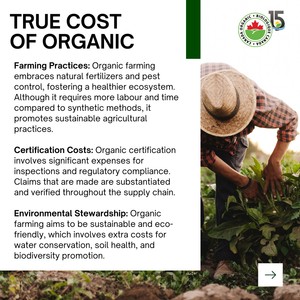
Sustainable Wine - how far have we come?
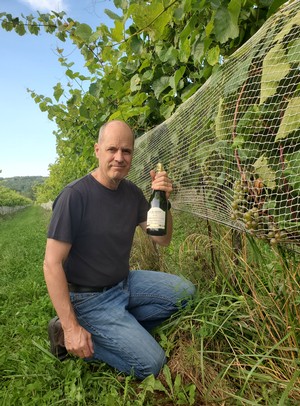
How far have we come? Sustainable wine may sound like a buzzword created by corporate wine executives to sell more wine and give impressions that all wineries must already subscribe to the concept because it's repeated in marketing so much and seems attainable but there remains a large gap between wine producers. You’d think the wine industry would have progressed the most since the beginnings of the environmental movement in the 1960’s, their marketing is so visible, seductive and competitive. But like climate change, microplastics and bee colony collapse there continue to be issues that our society has been slow to understand and act on. Why aren’t we more advanced? The alarm sounding, environmental catalyst classic Silent Spring by Rachel Carson was published in 1961 and the culture at the time was that synthetic insecticides will save the world. Her dystopian outlook for the environment affected by these persistent chemicals such as DDT threatened that culture and she was attacked and muffled by stakeholders and the misinformed. Scenarios repeated time and time again for the last 60 years.
Wine, the beverage of ingredients. If mother nature doesn't provide during the growing season, well there’s an ingredient for that. And the range is great – Mega Purple for colour, potassium sorbate for stability, crushed chestnuts for more tannin, gelatin for less tannin, citric and tartaric acids for more acidity, potassium bicarbonate for less acidity, even ethanol for more alcohol, and water for less alcohol. There are animal inputs like egg whites, gelatin, milk protein, and synthetic inputs like PVPP (plastic) and a broad range of synthetic pesticides. I introduce vineyard inputs here because whatever is added to the vineyard ends up in your glass as residual chemicals. Similar to Silent Spring’s explanation of the relationship of aerial spraying DDT on Elm trees and the residue on leaves killing robins via earthworms. Many pesticides are systemic, they protect the vine from within by being absorbed into tissues, vascular system and berries, and even contact pesticides are absorbed into the plant, like our skin absorbs. Most provincial liquor boards require a pesticide residue analysis before listing a wine because there are limits set. Limits that are recognized to be safe doses, not carcinogenic. But pause here and think about the last 60 years and how we seem to have learned so little. The World Health Organization (WHO) classified Roundup, a too common glyphosate weed killer used in vineyards, as probable carcinogen but changed it to possible carcinogen in the 80's after chemical industry lobby pressures. It is now back to probable carcinogen.
Read Organic diets quickly reduce the amount of glyphosate in people's bodies
Raise your hand if you are interested in sustainability. In protecting our precious environment and your health, and your community’s health. Brock University recently conducted wine research: An Exploration of Consumer Perceptions of Sustainable Wine. Over 700 people surveyed.
“Consumers with high involvement in sustainable wines tend to be younger, better educated, more involved in wine in general, and spend more per bottle than those with low involvement.” Pickering, Best, 2023
“Results show that sustainability-related cues are somewhat valued by consumers when making purchase decisions, but have low importance relative to the other cues examined. Environmental dimensions of sustainability have high saliency, in contrast with social and economic dimensions, and a significant minority of respondents report no or very limited knowledge of sustainable wines.”
There is change happening and it is generational – millennials and Gen Z are leading consumers. In Europe the changes are most apparent. Spain’s Denomination of Origin Penedès in Catalunya (DO Penedès) recently announced an extensive roadmap up to 2030, taking into account sustainability and establishing the region as a high-quality wine producer in Spain. Most immediately, all grapes for DO Penedès wines must be from fully-certified organic vineyards by 2025.
Full article: DO Penedes Organic Wine Plans by Decanter
European government funding for vineyards is based on level of sustainability, with certified organic being king. And as noted, quality is a large motivator for this Spanish region. Climate change resilience is a benefit too with cover crops, diversity and minimal tillage protecting the soil.
The organic approach is only natural inputs into grape growing and winemaking with every step monitored for traceability and transparency by rigorous third party inspections. Biodiversity of cover crops between rows create habitats for predatory insects such as parasitic wasps and dragonflies and protects the surface of the soil so that soil fungi and earthworms can cycle nutrients to roots which helps sequester carbon in a uniquely living regenerative agriculture system. Living soils are the goal of organics and nurturing it with composted grape pomace teeming with fungi extends vine root zone influence by as much as 10 times with symbiotic fungal filament networks. Vegan viticulture excludes animal manures that can lessen living soils and cause pollution of underground water systems. Vegan certified producers extend this concept to winemaking with no animal inputs. A common ingredient is gelatin and this is made from slaughthouse waste. Other ingredients not allowed in organic winemaking include synthetic preservatives, irradiated and genetically modified ingredients.
I’m in! How to find organic wines. Read labels and find organic vegan wines here! In Canada, only organic wines from soil to glass can bear the Canada Organic logo on the label. Wines that are made from organic grapes but not organic winemaking can not have the organic logo because the treatment of the wine after growing is unknown, and the integrity of chain of custody of grapes that went into bottles is equally unknown. Certification to the Biocyclic Vegan Agriculture standard, based in Europe, ensures wines have no animal inputs from soil to glass. This has far reaching benefits to climate change mitigation and animal welfare.

World Soil Day
World Soil Day - December 5, 2023
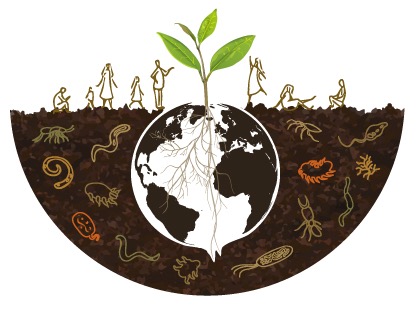
Happy World Soil Day. Why have a day dedicated to something as common and seemingly mundane as dirt? 95% of our food comes from it - it’s as important as sun and water. The United Nations has chosen a soil and water theme this year to showcase that healthy soil is a natural filter to hold and purify water as it makes its way into our drinking water. There is a symbiosis between soil management, microorganisms, water and soil structure that is critical for life and organic and vegan farming is the best way to sustain it.
Compaction, erosion, pesticides and more contribute to soil degradation and climate change is accelerating impacts. Human activity has to change to preserve soil.
Some our organic viticulture and vegan farming practices that sustain our soil:
- Soil structure – humus is decayed plant and animal matter and helps soil retain moisture, think of forest floor soil. Vegan farming doesn’t use animal manures, only plant-based composts are used to increase humus levels. We are certified to the Biocyclic Vegan Standard. Animal manures can contaminate water systems because they are added in early spring to allow enough time to become readily available to plants, very often leaching through the soils to water aquifers.
- Regenerative agriculture – one of organic farming pillars is keeping bare soils protected with cover crops. Winter wheat, fallow fields of clover and constant perennial plants between vineyard rows are examples. Combined with minimal tillage, soil retains and absorbs carbon, is more resistant to erosion and delicate microorganisms are preserved.
- Living soil – when plants made their evolutionary step from nutrient-rich marine environments to terrestrial they had to make alliances with soil microorganisms. Mycorrhizal fungi, for example, can increase a plant’s root zone influence by 10x with its filamentous network. Benefits of a living soil include climate change resilience, better terroir flavours for organic wine, healthy plants, biodiversity and less nutrient additions. Plant-based composts from grape pomace are teeming with microorganisms, inoculating the soil and vines. Our living soils are then preserved with minimal tillage, cover crops and not using pesticides.
Watch this video Making Compost Tea.
Our vineyard supervisor, Chris, explains our organic and vegan practices
We have been an organic winery from inception and certified vegan vineyard and winery since 2021, although our vegan winemaking goes way back. Biocyclic Vegan is our certifier from soil to glass and our vegan wines from our Gaspereau winery have been turning heads and winning national and international awards for over a decade.
As our vineyard supervisor, Chris, notes in this superb video, vegan vineyards do not use animal manures and instead management nutrients with composted grape pomace from harvest. It nourishes our living soils with organic matter teeming with mycorrhizal fungi that sequester carbon and does not pollute water systems like animal manures. Biodiversity and regenerative agriculture aspects are discussed as well.
Related blogs,
First Biocyclic Vegan winery and farm in North America
Is your wine organic or certified organic?
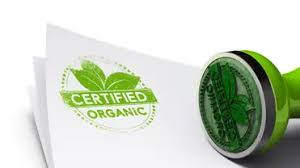
If you look at our website you’ll notice that we use the term “organic” often, and only when we reference our certifying body do we say “certified organic by Pro-Cert”. We can say “organic”, and we do many times because all of our wines are organic, but we can not say “certified organic” by itself, according to the current Canada Organic standard. We disagree with this requirement.
Canadian Food Inspection Agency (CFIA) regulates the Canada Organic standard and have a draconian regulation that restricts organic operations like our winery to not use the term “certified organic” unless we say who we are certified by. I’m even inviting an official non-compliance letter from them for writing this blog with that term. Why do they have this regulation? They argue that it sounds like a higher level of organic status compared to someone claiming organic. And here is where it gets even more unfair – a non-organic operation can claim organic on their website and other marketing media as long as not where their product is sold. Here’s an example of a website for an imaginary conventional winery not making organic wine: “We follow organic practices in our grapegrowing to make quality wine. Buy our wine here”. They don’t sell grapes, so no offence there. They sell wine, but are not claiming that the wine is organic, so no offence there either.
We need changes at the five year review of the Canada Organic standard this year so that we and other organic producers can use the term “certified organic”. We are certified, not merely making a general claim, and deserve to use the term to stand out in a crowded and noisy marketplace. We spend many dollars every year to have rigorous inspections, traceability audits and mass balance audits all to prove to CFIA that we follow the organic standard. Organic operations in United States are allowed to use the term. It’s time to update the Canada Organic standard so we can use it as well.
Read more about the benefits of choosing organic wine,
Transparency and Sustainability:the benefits of choosing organic and vegan wine
Fungus for climate change resilience
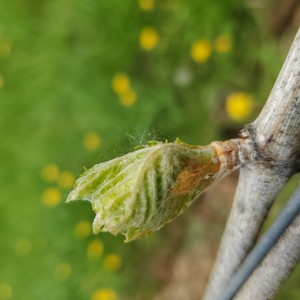
The world of fungi is amazing. I always credit kombucha’s yeasty cloudy popularity to wine lovers’ rapid acceptance to similarly cloudy Petillant Naturel wines. And Hollywood’s portrayal of “mind-controlling” fungus in Last of Us has further vaulted fungus to rock star status, a sinister version in this case. Another fungus, a beneficial one, called mycorrhiza lives in soil and has a critical symbiotic relationship with roots to help vines access water and nutrients especially during drought and other extremes from climate change. This is a true rock star.
When plants made that difficult evolutionary step from a nutrient-rich marine environment to a relatively harsh soil home, they had to make an alliance with microbes in the soil to survive. Mycorrhizal fungi grows into root cells to access carbohydrates from the vine, and in exchange, root zone influence of the vine expands to 3-10 times with a complex network of fungus filaments. I call this microbial terroir. Water, nutrients and “flavours” in soil are more accessible for the vine.
Organic practices at our Gaspereau vineyard encourage this living soil, rather than the conventional approach of ignoring microbes and following a regime of feeding vines directly with readably accessible synthetic fertilizers. The microbes seem to know – decreasing their relationship with the roots, almost sensing that they are not needed to cycle nutrients for the vine. Same outcome with animal manures. Other practices that kill fungi are tilling excessively between vineyard rows rather than using a constant cover crop and using herbicides like glyphosate (Roundup). We make plant-based compost teas, a veganic approach, to inoculate vines with beneficial fungi – crowding out disease organisms on leaves and further enhancing soil and roots. It's why we are Biocyclic Vegan
Strengthening our microbial terroir helps our vines be more resilient to climate change. Accessibility to nutrients and water is enhanced and that's especially important with extreme weather events.
Here's an article about research in Portugal,
The microbes that could protect grapevines from climate change
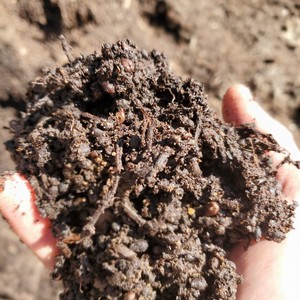
Environmental benefits of using cork
Honoured to receive this award from Amorim Cork, our cork supplier. A whopping 10 tonnes of carbon dioxide sequestered from our use of cork in 2022!
We are proud to give you this honor and please feel free to share with your team or customers your carbon retention number! This number has been independently validated by Pricewaterhouse Coopers and/or Ernest and Young. The findings, are the only ones to date that underwent a multi-closure comparative peer review, indicating when considering sequestration by the ecosystem made feasible by the cyclic extraction of cork, a retention capacity up to 288 grams of CO2 is associated with every natural cork stopper and as much as 562 grams with a sparkling wine stopper, in stark contrast to the CO2 emissions to each plastic stopper (up to 14.8 g/sealant) and to aluminum caps (up to 37.2 g/cap). To find out more about the sustainability studies and on going efforts Amorim is making on your behalf please visit the following link here.
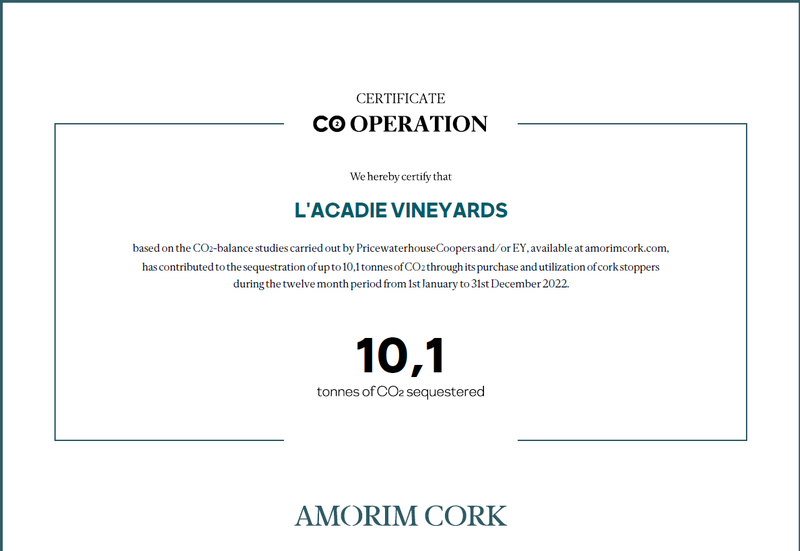
Earth Day- be a part of the solution
Earth Day: April 22, 2023
Atmospheric CO2: 420ppm
We all want to be part of the solution to help Mother Earth. If you were born in the 60’s, atmospheric CO2 was 320ppm, now it’s 420ppm. We are on the wrong path, as NASA describes in this dramatic graph.
L'Acadie Vineyards makes organic and vegan wines, from soil to glass, for people who care. Delicious healthful wine that you'll be proud to serve for memorable occasions knowing that you are part of the solution.
It's simple to get our wines to be a part of the solution today,
- Choose our organic wine – look for the Canada Organic symbol on the bottle, every one of our wines has it. It means rigorous inspections, transparency and traceability
- Buy at wine bars and restaurants, private wine stores, online, direct from our Gaspereau winery, and NSLC
- Enjoy our delicious organic wine with friends and family along with organic food. Share your experience to amplify your impact for change.

Here is the difference you’ll be making. When you purchase organic food like our organic vegan wine you are contributing to a greener planet.
- Grapes are one of the dirty dozen – 12 fruits and vegetables that are heavily sprayed with pesticides and you can avoid those residual pesticides in your wine by buying organic.
- Pesticides can contaminate groundwater and poison your community’s drinking water.
- Our vegan wines certified by Biocyclic Vegan International don’t use animal manures in growing grapes or the many animal ingredients commonly used for winemaking. Large scale livestock farming has been proven to generate 14% of greenhouse gases.
Make a difference today. Be a part of the solution for Mother Earth and enjoy delicious wine today. We've done the hard work so it's easier for you.
Order here
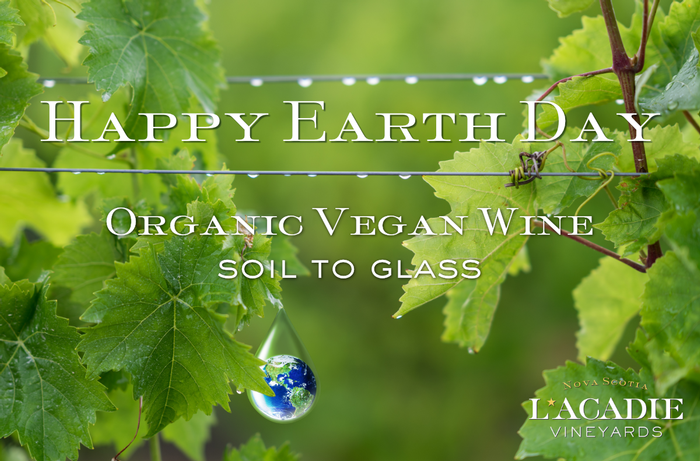
Transparency and Sustainability: the benefits of choosing certified organic and vegan wines
Transparency and Sustainability: the benefits of choosing certified organic and vegan wines
Welcome to our blog! We are passionate about certified organic and Biocyclic Vegan wines, and committed to sustainability and transparency in everything we do. Discover why our award-winning wines are a must-try for health-conscious wine lovers.
Ingredients
Transparency is a cornerstone of certified organic and certified Biocyclic Vegan wines, backed by rigorous inspections of grape growing and winemaking, to inform you of what is not in your wine. The Canadian Organic Standard prohibits genetically modified ingredients, synthetic pesticides and synthetic fertilizers, and the Biocyclic Vegan International Standard prohibits animal inputs in the vineyard and winemaking. This effectively eliminates many common ingredients and since nutritional information and ingredient declarations are not required for wines, certified organic vegan wines are your only guarantee of what wasn’t added to them.
The certification logos on labels are your guide to choose wisely. You can also view our list of organic wines at our certifier’s site,

Health
Lower alcohol in cool climate wines offers a health advantage, another benefit of buying local. Add the health benefits of organic wines and you have a winning combination! You avoid synthetic pesticide residues - yes, every spray in the vineyard makes it into your glass, and preservatives such as potassium sorbate. Sulfite is naturally occurring, produced by yeast, and organic winemakers can only adjust sulfite levels to half the maximum in federal standards.
Alcohol and Wine - new Canadian alcohol consumption recommendations
Social Change and Environment
Biocyclic Vegan standards start in the vineyard compared to other vegan certifications that just focus on winemaking. These wines are vegan from soil to glass, and not using animal manures is a clear message to oppose conventional livestock practices. Composted grape pomace, left over after pressing, is alternatively used to create a humus-rich soil teeming with beneficial microbes - a living soil that supports vine health.
Cover crops and no-till practices, a pillar of organic agriculture, promote living soils and better nutrients, and mounting information indicates that carbon-holding benefits can lessen global warming.
Water and air quality benefits from organic practices are well proven. Nanotechnology is prohibited because these engineered substances in food and packaging can add to the problems of plastics in our water systems and our health..
~~In vino veritus
Research on microbial terroir and its impact on wine flavour
Research on microbial terroir and its impact on wine flavour - play the video
~a collaboration with Saint Mary's University on indigenous microbe populations in our Gaspereau estate vineyard and the resulting flavour of our Pet Nat and other organic wines
SMU Clarissa Sit V2 from Saint Mary's University on Vimeo.
More blogs about our certified organic vegan vineyard:

